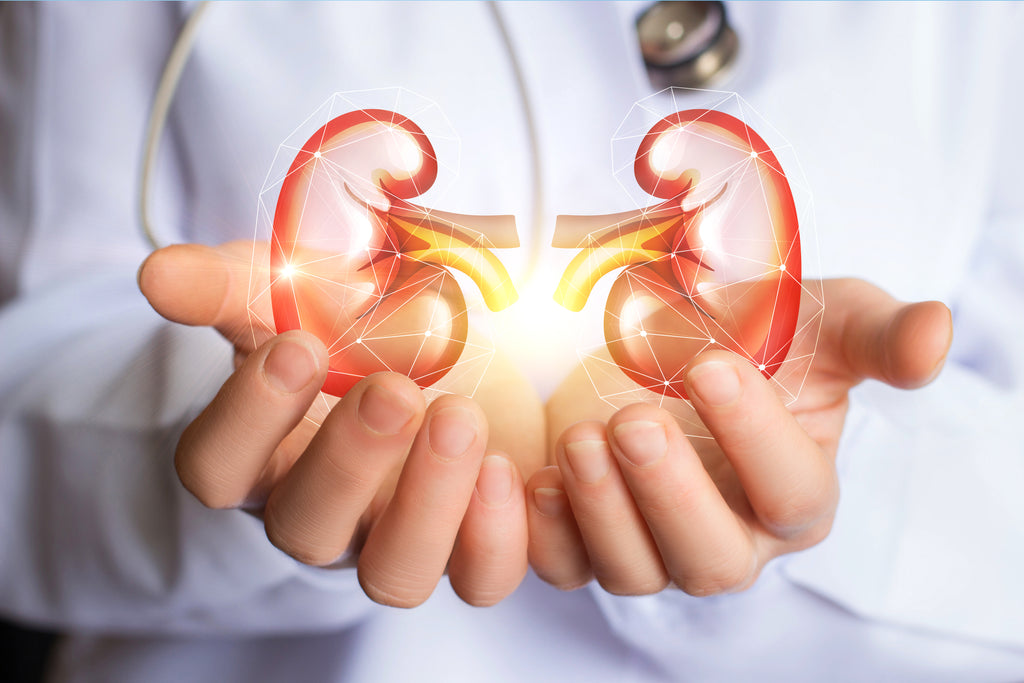When people talk about detox, they’re often wondering how to detox the liver or improve liver function. But, it’s actually your kidneys that take most of the toxins out of your body. A full kidney detox is rarely necessary as long as you have a good diet and stay hydrated, but there are many simple ways to support kidney function and stay healthy.
How Do Your Kidneys Work?

You’re born with two kidneys, one on either side of your spine, just under your ribcage. They’re each the size of a clenched fist, more or less. The kidneys are basically your body’s filtration system, cleaning and checking your blood to make sure it carries only what you need around the body. Your kidneys:
- Remove waste and unnecessary fluid, which then becomes urine
- Work as a filter for the blood, allowing some compounds to remain while getting rid of others
- Produce growth chemicals
- Help regulate blood pressure
- Help regulate the body’s levels of key minerals like potassium and calcium
- Control red blood cell production
Your kidneys filter about 150 quarts of your blood each day. It’s clear that if you don’t look after your kidneys, you could be in real trouble!
How to Flush Kidneys
Knowing how to flush your kidneys isn’t as complicated as it sounds. Primarily, your kidneys are fairly self-sufficient, and in healthy people, even a 30% loss of kidney function may not be noticeable. However, keeping yourself healthy and promoting good kidney health means making sure you:
- Avoid too much sugar and trans fats
- Drink plenty of water and avoid filling up on soda, alcohol, or caffeinated drinks
Some over the counter medicines may interfere with liver function, particularly if you’re already taking prescription medicine. Always check with a doctor before taking additional medication.
Flushing kidneys are essentially rinsing them out so that they go through a period of filtration where they don’t have to deal with as many toxins as usual. In essence, you’re giving them both a break and a cleanout. You can do this by:
- Drinking your daily recommended amount of water
- Eating fruits like berries and watermelon
- Staying off the booze for a few days
- Reducing your salt intake
- Reduce your caffeine intake
- Stop smoking or seek help to reduce a smoking habit
These steps could help maintain proper kidney function and help lower the risk of kidney stones, which are crystals that build up in the kidney and form lumps. These lumps may be too big to pass when you urinate and may become very painful.
What Is the Best Drink to Flush Your Kidneys?

Your body experiences a kidney flush every day as long as you stay hydrated. Your blood, when low on toxins, flushes through your kidneys constantly, so it makes sense to keep yourself healthy and hydrated in order to keep your kidneys healthy.
Waste products and fluid collect as urine in the renal pelvis, a funnel-like part of the kidney. If you have healthy renal pelvis function, the urine will drain into the bladder, making you need to urinate once your bladder is full.
Drinking fluids with chemicals that are beneficial to your kidneys could support your kidney function, giving you a kidney cleanse to keep them in good working order. Popular drinks to flush kidneys include:
- Beetroot juice which contains betaine, a beneficial amino acid
- Cranberry juice makes urine more acidic, which may protect the kidneys and can lessen the risk of UTIs (urinary tract infections).
- Some herbal teas, although check with a doctor first- popular options include hydrangea tea, nettle tea, or simply green tea, which is high in antioxidants
Food for Kidney Cleansing
There are several foods that could be really good for your kidneys when eaten as part of a healthy lifestyle. They include:
- Cranberries, no surprises here as cranberry juice is so beneficial for kidney health, as is the fruit itself.
- Seaweed
- Soya, as it’s high in calcium- there’s a myth that too much calcium causes kidney stones, but actually, calcium is great for kidney health.
Do Kidney Supplements Help?
Rather than worrying about how to do a liver and kidney cleanse, you could be supporting daily organ health with the right supplements. Supplements give your body vitamins, minerals, or other compounds you might be missing from your daily diet. Although it’s possible to get everything you need by eating a perfectly balanced diet, this is very tricky in a world with so many demands on our time- and our bank balance!
Kidney RX is an example of a supplement designed to support kidney health. These are easy to take capsules, which combine a range of natural ingredients, including:
- Beetroot, which we’ve already learned is great for kidney health
- Grape seed extract, a natural antioxidant.
- Astragalus, also known as huáng qí and milkvetch, which is thought to reduce inflammation and boost the immune system.
- Pine bark, which may support the kidneys when you are experiencing high blood pressure.
When taken with plenty of water and as part of a healthy lifestyle that includes exercise, you could find that intelligently crafted supplements like these support not only your kidney health but also a healthy bladder for all-round urinary health.
Did you know how hard your kidneys are working for you? Make sure you say thank you with plenty of water, a great diet, and the right supplements to support your ongoing health.
Takeaway
Knowing how to flush the kidneys and liver is about staying hydrated, having a great diet, and when needed, investing in high-quality health supplements.
The information being presented in this blog is intended to be used as educational or resource information only. It is not intended to be a substitute for medical advice from your healthcare provider. This content should not be used for the diagnosis or treatment of any medical condition. If you have any questions or concerns about your health, please contact your healthcare provider. You should call 911 for all medical emergencies. Revive MD is not liable for any advice or information provided on this blog, which advice or information is provided on an “as-is” basis, and assumes no liability for diagnosis, treatment, decisions, or actions made in reliance upon any advice or information contained on this blog. No warranties, express or implied, are made on the information that is provided.


